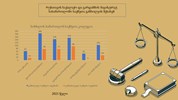Delayed justice - what remedies do the parties have?

In Georgia, the excessive workload in courts has become an acute problem recognized by all justice players, which is continuously addressed and relevant but remains unresolved.
"Justice delayed is often justice denied" (Vazagashvili v. Georgia 50375/07; October 18, 2019). Regardless of the outcome of the proceedings, delays might render them so ineffective that the legal issue loses all relevance. For the same reason, citizens frequently hesitate to pursue legal remedies since the time required to reach an outcome makes this route less valuable. Furthermore, from a medical standpoint, the uncertainty associated with waiting for an extended period for a disputed issue to be resolved is particularly stressful for the individual. Therefore, hearing cases within an unreasonable period is clearly considered a violation of the right to a fair trial.
The issue confronting the Georgian judicial system is not only the unduly protracted consideration of cases, which contradicts the necessity of the right to a "fair trial" guaranteed by the European Convention but also the disregarding of the time limits set by procedural legislation.
Georgian legislation provides for the following procedural time limits for consideration of a case:
- The first instance court issues a judgment no later than 24 months after the pre-trial judge decides to refer the case for consideration on the merits; However, in certain cases, the established time limit does not apply, in particular, in criminal cases in which the accused fails to appear in court and/or the accused is wanted (Criminal Procedure Code Article 185(6)(7).
- The court hears the civil case within two months of receiving the lawsuit (Civil Procedure Code Article 59(3). Except in cases provided for by law, this time limit may be extended for no more than five months by a decision of the court hearing a particularly complex case category. Administrative disputes are subject to the same rule.
Regardless of specific statutory deadlines, there are often instances where cases cannot/will not be completed within the timeframe required by law, and as a result, we end up with delayed justice.
What can lead to a violation by a judge of the time limits established by the procedural law?
The only option for parties whose cases are being heard in violation of procedural time limits and are dragging on is to address the High Council of Justice's Independent Inspector. One of the grounds for disciplinary action against a judge, according to Article 751 of the Organic Law “on Common Courts,” is “a substantial violation by the judge of the time limit set by Georgian procedural law for no valid reason.” According to the Organic Law, the violation reason of this term is not considered “not valid” if the judge could not comply with the established time limits “due to objective circumstances directly related to the administration of justice.” Objective circumstances are considered to be: the excessive workload, the complexity of the case, etc.
It is significant that in the practice of disciplinary hearings conducted by the High Council of Justice of Georgia, cases relating to the aforementioned disciplinary ground - violation of procedural conditions - predominate.
To give an example, out of the last 20 disciplinary cases, 13 cases concern the delay in case hearings.
It is significant that in all 13 disciplinary cases mentioned below, where the parties indicated a violation of procedural time limits in the hearing of their case, the disciplinary proceedings against the judge were terminated by the decision of the High Council of Justice:
1. Disciplinary Case No. 41/20;
2. Disciplinary Case No. 46/20;
3. Disciplinary Case No. 55/20;
4. Disciplinary case No. 59/20;
5. Disciplinary case No. 67/20;
6. Disciplinary case No. 74/20;
7. Disciplinary case No. 78/20;
8. Disciplinary case No. 80/20;
9. Disciplinary case No. 87/20;
10. Disciplinary case No. 88/20;
11. Disciplinary case No. 93/20;
12. Disciplinary case No. 95/20;
13. Disciplinary case No. 100/20.
The European Convention on Human Rights obliges States to organise their judicial systems in such a way that their courts are able to guarantee the right of everyone to obtain a final decision on disputes concerning civil rights and obligations within a reasonable time. (Comingersoll S.A. v. Portugal [GC], 2000, § 24; Lupeni Greek Catholic Parish and Others v. Romania [GC], 2016, § 142).
Concerning the specific violations, the State is responsible not only for the prompt administration of justice but also for those cases where it cannot augment the resources of the judicial system, even though delays may be caused by excessive workload and inadequate judicial structures. (DJ Harris, M O’ Boyle, C Warbrick “Law of the European Convention on Human Rights”,1995, p. 227).
The restrictions necessitated by the Covid-19 crisis could have understandably had an adverse effect on the processing of cases before the domestic courts (Q and R v. Slovenia, 2022, § 80), but this cannot absolve the State from its responsibility for the lengthy proceedings.
If the situation of court excessive workload persists and structural organization is an issue, the state should ensure that efficient measures are taken. (Zimmermann and Steiner v. Switzerland, 1983, § 29; Guincho v. Portugal, 1984, § 40). The fact that backlog situations have become commonplace does not justify excessive length of proceedings (Unión Alimentaria Sanders S.A. v. Spain, 1989, § 40).
“Georgian Court Watch” urges the judiciary to take such steps to ensure that cases are heard within the procedural time limits established by Georgian law, as well as to correct current practice following the requirement of the European Convention on Human Rights to have a case resolved “within a reasonable time.”
---
The materials distributed by courtwatch.ge and published on the website are the property of "Georgian Court Watch", when using them, "Georgian Court Watch" should be indicated as the source.

REFUSING THE RIGHT TO FAIR AND TIMELY TRIAL

Up to 50 decisions - how long it took to review administrative cases from the first instance to the Supreme Court

50 cases - how long did it take to consider civil disputes in all three instances?

Protracted cases - a problem that the court recognizes































